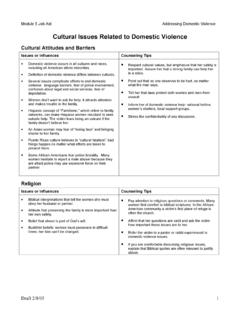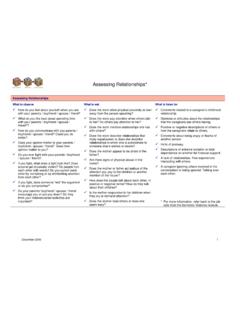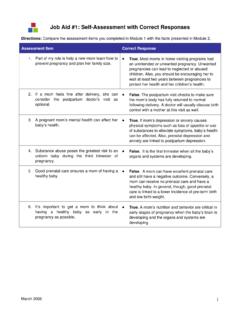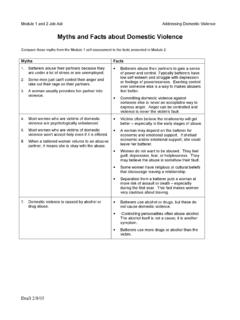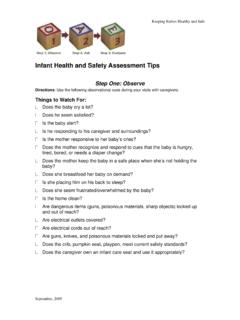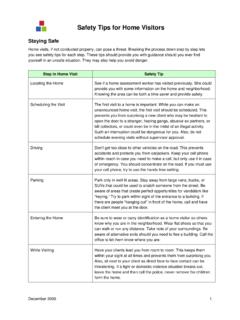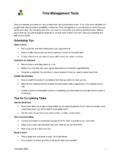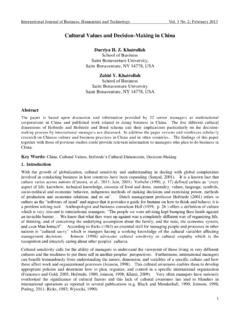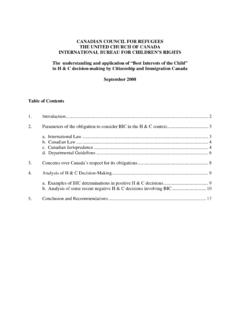Transcription of Module 5 Cultural Considerations Related to …
1 Module 5 Job Aid Promoting Mental Health July 2005 1 Responding to Cultural Issues Related to Mental Health Issue #1: Differing views and experiences of mental health services Issue Tips for Addressing These Issues To seek help, an individual must believe she has a health problem that will be responded to appropriately. The disparity in mental health care for minorities and the poor are well documented. ? African Americans may prefer to seek help from friends, family and religious leaders rather than from mental health professionals. ? Hispanics often encounter language barriers and professionals who are not aware of the various customs and Cultural differences among Latin countries. ? Asian Americans are more likely to seek treatment from a community or religious leader than from a mental health professional.
2 ? Many mental health professionals are not culturally sensitive in providing treatment options or services. As a result, some minorities may be cautious in following through on recommendations or prescribed medications. ? Acknowledge any past difficulty the caregiver may have had in seeking help. Respect her Cultural values, but stress that mental health concerns are just as real and important to address as physical health concerns. Assist the caregiver in finding a treatment option that either matches her culture or is culturally sensitive. ? Encourage your caregiver to trust her intuition if she suspects a problem of any kind. Emphasize that it s okay to ask questions and gather information. ? Point out that poor self-esteem, depression, anxiety, etc. are not healthy states of mind and good resources in the community are available to help address these concerns.
3 ? Point out that developing the skills for building esteem in herself and her children may increase her ability to handle it herself. ? Inform her of mental health and parenting resources. She may not know how to access these resources so be ready to explore them with her. ? Be willing to accompany the caregiver to a first appointment, if necessary. This may increase the likelihood of continued treatment, and may help to ensure appropriate services are offered. Issue #2: Perceived Stigma About Accessing Help Stigma and Beliefs About Accessing Help Tips for Addressing These Issues Fear of embarrassment or shame keep people from seeking help. Others will report physical symptoms rather than acknowledge a mental health issue. ? Some people may hesitate to get help because they fear others opinions.
4 They are afraid seeking help will result in personal or family shame. ? Older African Americans and Hispanics may not seek traditional mental health services due to concerns of stigma or a belief in other family resources as a source for help. ? African Americans, Hispanics and Asian Americans may suffer from somatization multiple physical ailments or complaints for which no medical diagnosis can be found. ? Many Asian Americans attach stigma to mental disorders because they think revealing problems or dealing with problems by seeking professional help are signs of personal immaturity, weakness, and a lack of self-discipline. ? Honor the caregiver s beliefs, yet explore ways in which she and family members can discuss the value of seeking appropriate help. ? If the caregiver or caregiver s family agrees, engage in some fun activities or share/tell stories about seeking and receiving help.
5 ? Stress the confidentiality of any discussion she would have with a doctor or mental health professional. ? If appropriate, help the caregiver think of ways to remove obstacles to getting help for herself or a child or to maintaining privacy. Obstacles could include lack of childcare, lack of transportation, inability to get time off of work, etc. Module 5 Job Aid Promoting Mental Health July 2005 2 Responding to Cultural Issues (cont) Issue #3: Differing Views on Authority and decision - making Issue #4: Spiritual and Religious Beliefs Issue Tips for Addressing These Issues When working with different cultures, you need to understand and respect the value placed on machismo, an elder, and others who hold authority and decision - making roles. ? In many Hispanic and Asian-American families, men often make the decisions and are the authority figure.
6 ? In many African-American (and even some Caucasian) families, the decision -maker may be the eldest member of the family, who may or may not live with the caregiver. ? To help a caregiver, you may need to involve another family member or significant other if that person is viewed as the authority or the decision -maker. ? Be inclusive of other family members in discussions about services. ? Be aware of Cultural protocol in addressing family members. ? Involve the decision -maker, if appropriate, in getting help. ? Be aware that decision - making roles may shift over time. For instance, a teen mom who demonstrates solid decision - making skills may earn more authority over time. ? Avoid projecting your own Cultural beliefs about decision - making onto the caregiver. Issue Tips for Addressing These Issues Religion plays a powerful role in many people s lives.
7 Religion can be a significant help to people in promoting mental health and offering counseling resources. ? Many families and Cultural groups prefer spiritual and religious resources to seeking traditional mental health services. ? In some families, members believe that prayer and faith alone will successfully treat depression or other mental health problems. ? Research studies reveal spiritual and religious faith can be beneficial in promoting positive mental health. ? If you are comfortable doing so, acknowledge the role faith and prayer can play in health issues. ? Pay attention to religious questions or comments. Many women find comfort in Biblical scriptures. In the African-American and Hispanic communities a woman s first place of refuge is often the church. ? Talk with pastors and rabbis to find out how to refer a caregiver to a pastor, rabbi, priest or other appropriate spiritual leader.
8 ? Be open to seeking and referring caregivers to support groups that support her Cultural or religious values. Often, support groups are effective and beneficial for people dealing with mild or moderate forms of mental health issues.
